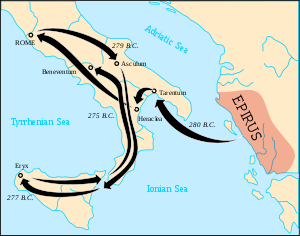Our website is made possible by displaying online advertisements to our visitors.
Please consider supporting us by disabling your ad blocker.
Pyrrhic War
This article has multiple issues. Please help improve it or discuss these issues on the talk page. (Learn how and when to remove these messages)
|
| Pyrrhic War | |||||||||
|---|---|---|---|---|---|---|---|---|---|
| Part of Roman expansion in Italy | |||||||||
 The route of Pyrrhus of Epirus during his campaigns in southern Italy and Sicily. | |||||||||
| |||||||||
| Belligerents | |||||||||
| |||||||||
| Commanders and leaders | |||||||||
| Pyrrhus of Epirus |
| ||||||||
| Casualties and losses | |||||||||
|
| ||||||||
The Pyrrhic War (/ˈpɪrɪk/ PIRR-ik; 280–275 BC) was largely fought between the Roman Republic and Pyrrhus, the king of Epirus, who had been asked by the people of the Greek city of Tarentum in southern Italy to help them in their war against the Romans.
A skilled commander, with a strong army supported by war elephants (which the Romans were not experienced in facing), Pyrrhus enjoyed initial success against the Roman legions, but suffered heavy losses even in these victories. Pyrrhus was unable to recover his losses due to financial and population limitations of Epirus. Romans, by contrast, had a very large pool of military manpower and could replace their losses. Plutarch wrote that Pyrrhus said after the second battle of the war, "If we are victorious in one more battle with the Romans, we shall be utterly ruined."[1] This is the source of the expression "Pyrrhic victory", a victory that inflicts losses the winner cannot afford in the long term.
Worn down by the battles against Rome, Pyrrhus moved his army to Sicily to war against the Carthaginians instead. After several years of campaigning there (278–275 BC), he returned to Italy in 275 BC, where the last battle of the war was fought, ending in Roman victory. Following this, Pyrrhus returned to Epirus, ending the war. Three years later, in 272 BC, the Romans captured Tarentum.
The Pyrrhic War was the first time that Rome confronted the professional mercenary armies of the Hellenistic states of the eastern Mediterranean. Rome's victory drew the attention of these states to the emerging power of Rome. Ptolemy II, the king of Egypt, established diplomatic relations with Rome.[2] After the war, Rome asserted its hegemony over southern Italy.
Previous Page Next Page


